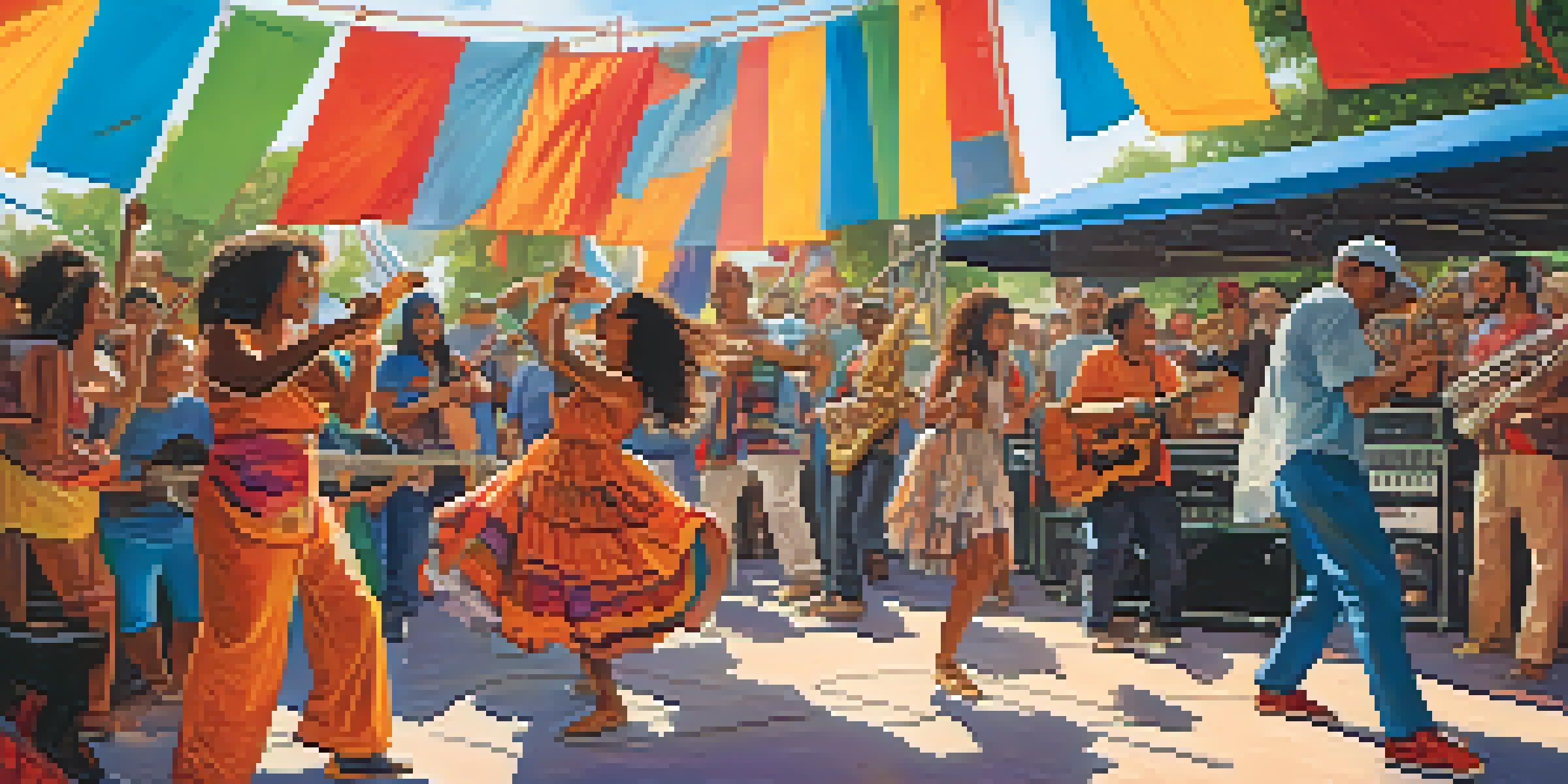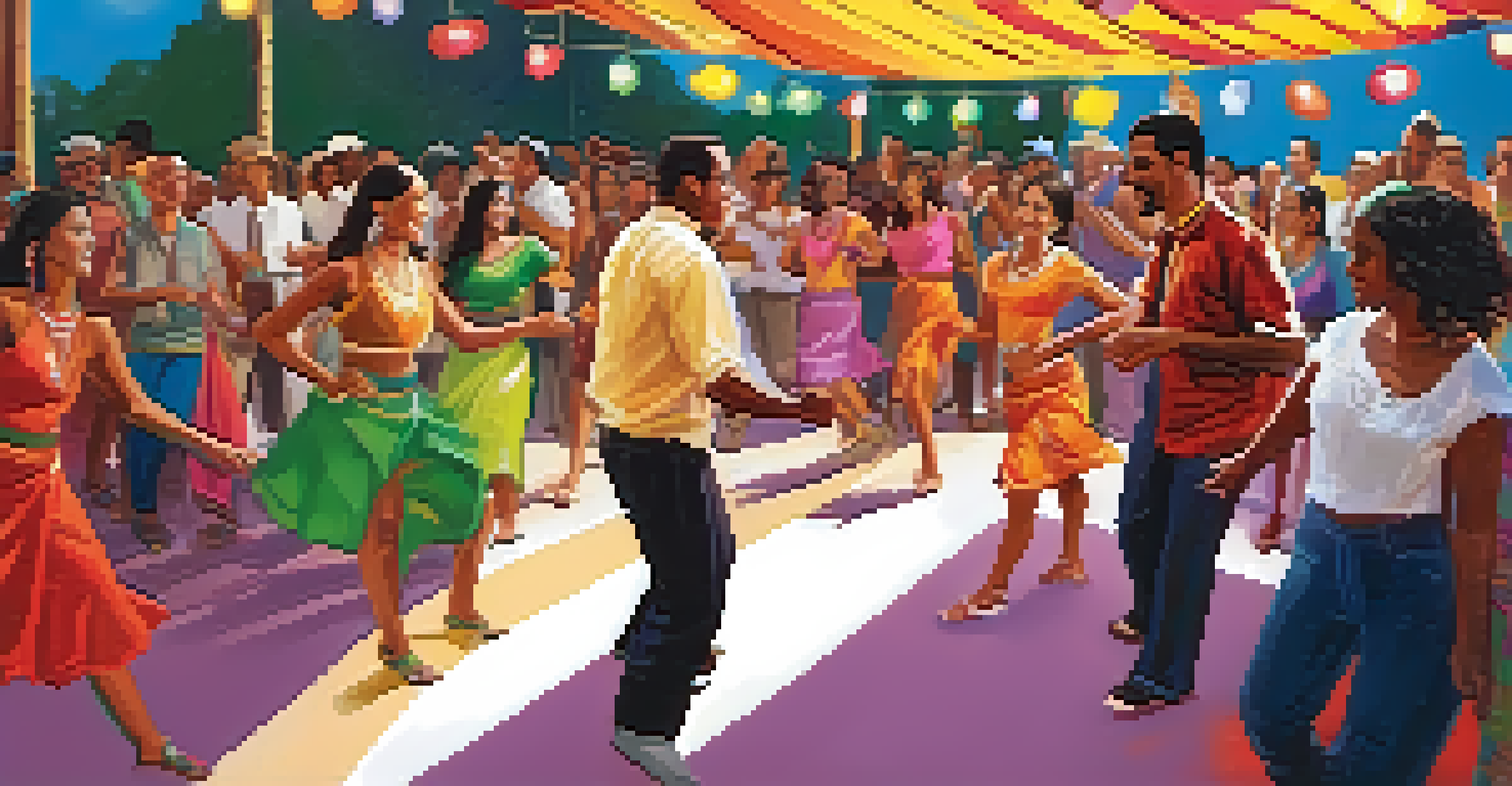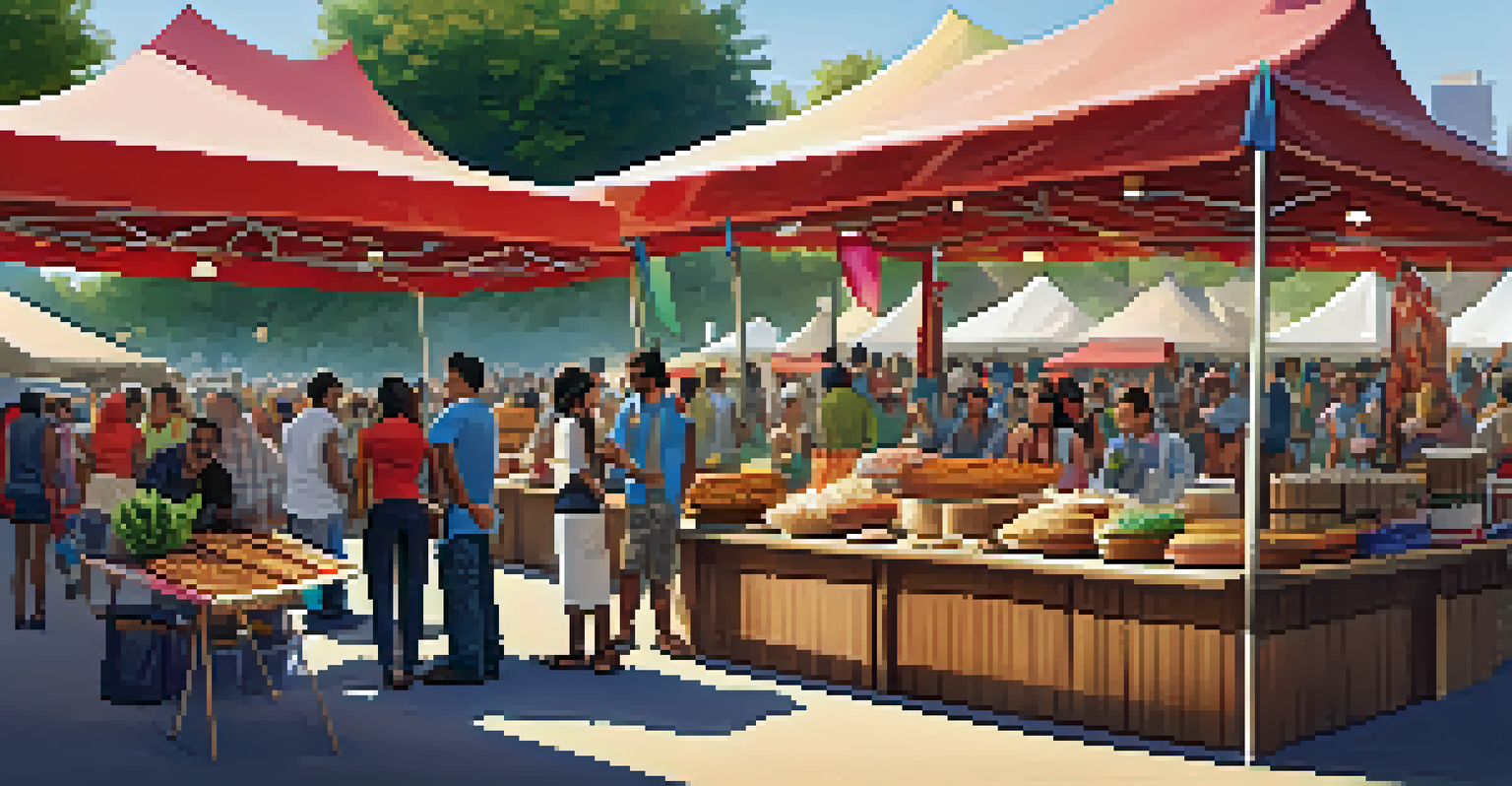How Local Music Festivals Promote Cultural Diversity

Local Music Festivals as Cultural Melting Pots
Local music festivals serve as vibrant melting pots where various cultures collide in a joyous celebration. These events draw people from different backgrounds, allowing them to share their unique traditions and experiences through music. For instance, a festival featuring genres from jazz to reggae can introduce attendees to sounds and styles they might not encounter otherwise.
Music is the universal language of mankind.
As attendees mingle and enjoy the performances, they often engage in conversations, sharing stories about their cultural roots. This interaction fosters understanding and appreciation for diversity, breaking down barriers that may exist in everyday life. The music becomes a universal language, helping to connect individuals who might have never crossed paths otherwise.
Moreover, local festivals often highlight indigenous or underrepresented artists, giving them a stage to showcase their talents. This not only empowers these communities but also enriches the festival experience for all attendees, creating a richer tapestry of sounds and stories.
Promoting Inclusivity Through Diverse Lineups
One of the most effective ways local music festivals promote cultural diversity is through their artist lineups. By featuring musicians from various genres and backgrounds, festivals create an inclusive atmosphere that celebrates every voice. This deliberate curation invites festival-goers to experience a wide range of cultural expressions all in one place.

For example, a festival might include everything from Afrobeat bands to Celtic folk groups, allowing attendees to explore the richness of different musical traditions. Such exposure can inspire curiosity and encourage further exploration of those cultures beyond the festival setting. It’s all about creating a space where diversity is not just recognized but celebrated.
Cultural Diversity Through Music
Local music festivals create inclusive spaces that celebrate a variety of musical genres and cultural expressions.
Furthermore, these diverse lineups often lead to collaborative performances, where artists from different backgrounds share the stage. These collaborations can create unique musical experiences, blending genres and styles that showcase the beauty of cultural fusion. It's a win-win situation, as artists gain exposure, and audiences are treated to unforgettable performances.
Cultural Workshops and Activities Enhance Engagement
Many local music festivals also offer workshops and activities that delve deeper into the cultures represented. These sessions might include dance lessons, instrument tutorials, or discussions about cultural history. By participating, attendees gain a hands-on understanding of the artistic practices that shape different musical traditions.
Diversity is not about how we differ. Diversity is about embracing one another's uniqueness.
For instance, a festival featuring Latin music might include salsa dancing workshops, allowing attendees to learn about the dance's cultural significance while having fun. These interactive experiences create lasting memories and encourage a greater appreciation for the art forms and cultures represented.
Additionally, these workshops often attract people of all ages, making festivals family-friendly. This inclusivity ensures that cultural education is passed down to younger generations, fostering a sense of respect and curiosity about diversity from an early age.
Fostering Community Connections Through Music
Local music festivals play a crucial role in strengthening community bonds, acting as a gathering point for residents and visitors alike. These events encourage people to come together, share experiences, and celebrate their unique identities within a larger communal framework. When everyone unites for a common love of music, it cultivates a sense of belonging.
Moreover, by showcasing local talent alongside international acts, festivals create opportunities for local artists to shine. This not only supports the local music scene but also reinforces community pride. When residents see their neighbors performing on stage, it strengthens their connection to both the event and each other.
Community Engagement and Pride
These festivals strengthen community bonds by showcasing local talent and fostering connections among residents.
Events like these often lead to collaborations beyond the festival, such as local businesses partnering with artists for promotions. This symbiotic relationship enhances the local economy and encourages residents to support one another, creating a vibrant tapestry of community spirit.
Economic Benefits of Culturally Diverse Festivals
Culturally diverse local music festivals also bring significant economic benefits to their communities. By attracting visitors from outside the area, these events boost local businesses, including hotels, restaurants, and shops. When people travel to attend a festival, they often explore the local culture, further stimulating the economy.
Additionally, festivals create job opportunities, from event planning to vendor positions. This influx of jobs can help support the local workforce and foster a sense of pride in the community. It’s a great reminder of how culture and economics can intertwine to produce positive outcomes.
Lastly, by promoting cultural diversity, these festivals can attract grants and sponsorships aimed at supporting the arts. This financial backing can be crucial for future events, allowing organizers to continue showcasing diverse cultures and expanding their impact on the community.
Encouraging Cultural Exchange Among Attendees
One of the most beautiful aspects of local music festivals is their capacity to encourage cultural exchange among attendees. As people from different backgrounds gather, they share not just music but also food, stories, and traditions. This exchange creates a rich tapestry of experiences that help break down stereotypes and foster mutual respect.
For instance, a festival might feature a variety of food vendors, each offering dishes from their respective cultures. Attendees who try new foods often find themselves curious about the stories behind the dishes, leading to conversations that deepen their understanding of different cultures. It’s this kind of interaction that enriches the festival atmosphere.
Economic Growth from Festivals
Culturally diverse festivals boost local economies by attracting visitors and creating job opportunities.
In this way, local music festivals become more than just entertainment; they transform into platforms for learning and growth. The conversations sparked by shared experiences can lead to friendships, collaborations, and a greater appreciation for the rich diversity that exists within our communities.
Celebrating Cultural Heritage Through Music
Music is often deeply intertwined with cultural heritage, and local festivals provide an essential platform for celebrating this connection. By showcasing traditional music genres and artists, festivals help preserve these cultural expressions for future generations. It’s like a living museum, where history and culture come alive through sound.
For instance, local Indigenous music festivals often include storytelling elements that share the history and significance of the music being performed. This not only educates attendees but also honors the traditions and values of the cultures being represented. It’s a beautiful way to keep cultural narratives alive.

Moreover, when festivals highlight cultural heritage, they inspire pride among community members. This pride can motivate individuals to share their traditions beyond the festival, encouraging others to explore and appreciate the rich cultural heritage that exists within their own neighborhoods.